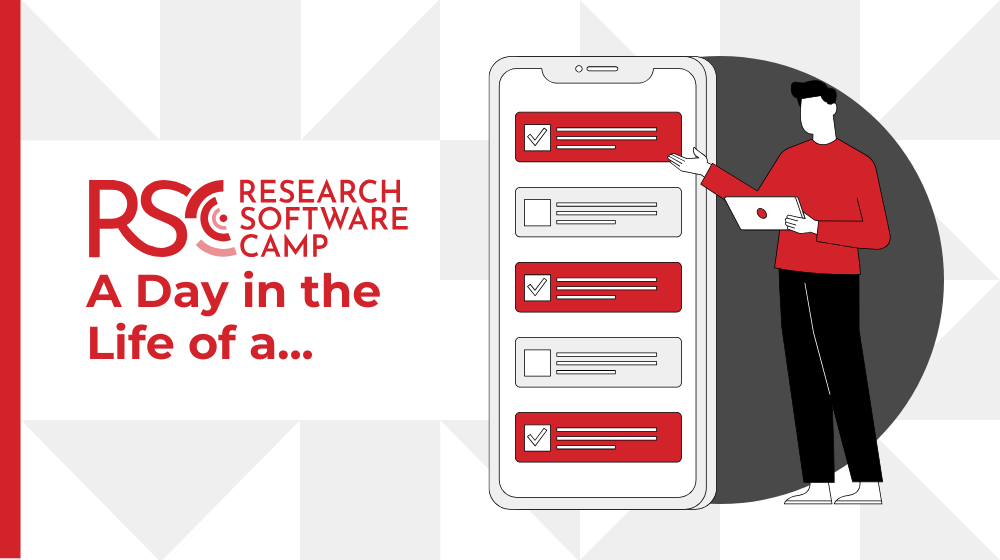As part of the Research Software Camps: Digital Skills for Research Technical Staff, we collaborated with professionals in their field to create a new series titled "A Day in the Life of a...". This series aims to highlight the responsibilities of these roles and provide insight into their daily activities. In this article by Michael Capeness (The Horsfall Group, School of Biological Sciences, University of Edinburgh), we learn more about what a day in the life of a lab manager looks like.
How would you describe your role to others?
I normally say that I am a Lab Manager. This means I help maintain and run a laboratory and the people in it, but I also carry out research in line with the lab’s interests in recapturing metals from waste using bacteria.
Talk us through a normal day as a Lab Manager
I arrive at the lab around 8:00 am, my first port of call is to get the pot of coffee on the go and turn my computer on. While they both warm up I walk around the various labs, making sure there have been no problems overnight with the various incubators we have. If everything is shaking away happily, I go through my emails. Normally there might be one or two from my PI or my colleagues, and perhaps an update about some of the items such as chemicals I have ordered, or an automatic alert about a new paper in my field. As my fellow lab members arrive, I ask them how they are, if they need anything for the day, such as from our local stores, or get back to them about any questions they may have had when I wasn’t around.
I can now start lab work, I’ll check the growth of the bacterial cultures or plates I set up yesterday, this will dictate what I need to do the rest of the day. I’ll also begin to carry out a little bit of genetic engineering, such as setting up a PCR, and restriction digest of DNA. These things normally take a long time to incubate, and/or have multiple steps, so the morning is the best place to start them. While I’m waiting for things to finish, I’ll take care of smaller tasks, perhaps I’ll make a bit of media and get it sterilized to fill a few tip boxes.
Lunchtime is dictated by the microbes I work on and what practical things I’m carrying out. If my bacteria are ready to be used, then my lunch waits until I’ve finished with them. As such it may be best to have an early or later lunch if I know I’m going to miss it. Often, it can be split into a couple of 10 minutes fragments around the middle of the day. Similarly, if I have a piece of equipment booked, I’ll be using that as access to such devices is prescribed by their availability, not mine.
After lunch, the lab tends to be at its fullest, I’ve normally been asked a few questions and had a few more emails about things. So, I can take care of those, I’ve also noticed one or two items in the lab need to be restocked so I’ll do some ordering, both internal and external. If the morning's experiments have gone well, I’ll continue with those or troubleshoot them if they didn’t. I’ll perhaps transform E. coli with the DNA I was manipulating earlier, and also set up new cultures/plates for the following day. I also tend to help my colleagues with the running of samples in other buildings, such as the electron microscope in physics or biology, and some chemical analysis machinery in chemistry, so this can be a big part of my afternoon. I’ll also have very informal meetings with some of the PhD students about their new set of results or if they were having problems with one of their experiments, so we’ll troubleshoot that together.
Normally once everything is in an incubated ready for tomorrow, or in a freeze/fridge I’ll have one last look through my emails to see if there are any urgent problems or to give me an idea of what I need to take care of first thing tomorrow. Much like my day started, I’ll have one last walk around the labs to see if everything/one is behaving and wish anyone left still working a nice evening.
What do you enjoy the most about your job?
I really enjoy helping people and enabling them to carry out their experiments. This can be from the planning stage, working through a hypothesis and how to test it, to the lab work stage, actually helping them get their data and analyze it. This makes each day quite diverse which is another great aspect of my job.
What is the hardest part of your job?
I do a lot of things, often which need to be done at once, I’m pulled in many directions by the needs of the lab and the people in it. Balancing and prioritizing this can be tricky.
What are some of your hobbies/extracurricular activities?
Outside of my normal work, our lab takes part in public engagement of the science. This often involves translating the science that we do in the lab for young children (and their parents), which is always very fun. We try to make this as engaging as possible, using smelly things, Lego, plushy toys, and other interactable items.
Personally, I enjoy going to comedy-related events with my friends both during the Fringe and outside of it. I also have a big interest in history so I normally listen to some kind of podcast about that, attend some of the lectures hosted by the university, or visit various museums.

